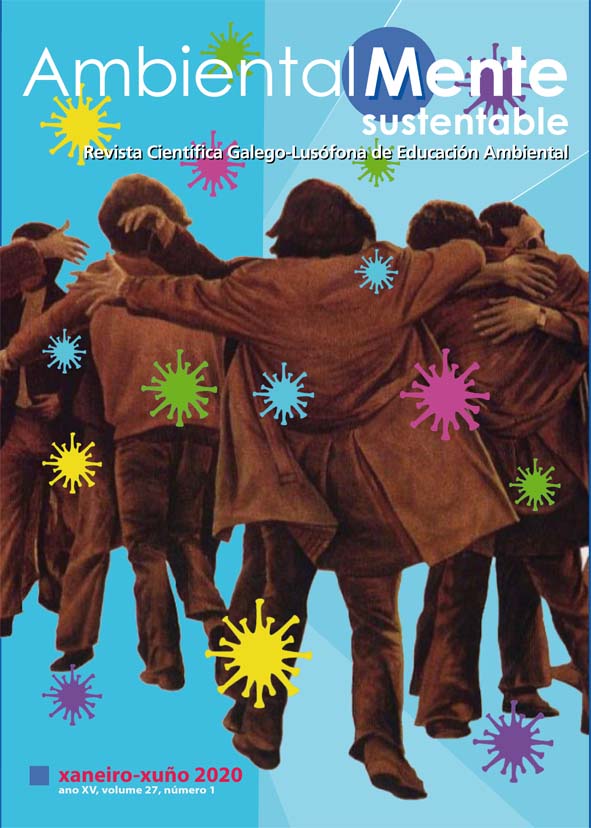#EA26: unha experiencia de ciberactivismo pola Educación Ambiental
DOI:
https://doi.org/10.17979/ams.2020.27.1.6619Palabras clave:
educación ambiental, ciberactivismo, movemento social, crise global, emerxencia climáticaResumo
#EA26 é un movemento ciberactivista pola Educación Ambiental que naceu nas redes sociais para, desde elas, darlle visibilidade e crear redes para a acción ecosocial según os principios do Libro Branco da Educación Ambiental de España. Desde o ano 2014, #EA26 ten desenvolvido debates, entrevistas, campañas e ciberaccións no espazo dixital. E, dun xeito complementario, tamén ten participado en accións presenciais, organizando dous encontros estatais de educadoras e educadores ambientais e participando en eventos internacionais como a COP26. As chaves do movemento son a horizontalidade, a participación, ea colaboración voluntaria dos seus membros e a axilidade en dar resposta ás iniciativas e oportunidades de acción. As aportacións á Educación Ambiental foron reflectidas na visibilidade do sector, ao despertar o sentido de pertenza, ao ser referentes e á xeración de impacto. #EA26 define as accións de Educación Ambiental como microaccións políticas imprescindibles para promover o necesario cambio ecosocial ante a inminente crise global á que se enfrenta o planeta.
##plugins.themes.default.displayStats.downloads##
Citas
#EA26 (2020). La competencia ecosocial, indispensable para tu salud. #EA26 Educación ambiental. [Recuperado de https://educacionambiental26.com/competencia-ecosocial].
Alaminos, A. e C. Penalva-Verdú (2018). Economía colaborativa: definiciones y escenarios, SOCIOLOGIADOS. Revista de Investigación Social, v. 3 (1), páxs. 15-36.
Calvo, S., J. Ferreras, e D. Rodrigo-CanO (2020). La Educación Ambiental en las redes sociales: #EA26, Revista de Educación Ambiental y Sostenibilidad 2(1), 1301. [https://doi.org/10.25267/Rev_educ_ambient_sostenibilidad.2020.v2.1.1301]
Comisión Temática de Educación Ambiental (1999). El Libro Blanco de la Educación Ambiental en España. Madrid: Ministerio de Medio Ambiente.
De La Cueva, J. (2015). Manual del Ciberactivista. Teoría y práctica de las Acciones Micropolíticas. Córdoba: Bandaàparte Editores.
Ferreras, J., S. Calvo e D. Rodrigo-Cano (2019). La Red nos atrapa. Hacia una educación ambiental abierta y libre. En Javier Benayas e Carmelo Marcén (Eds.), Hacia una Educación para la Sostenibilidad, páxs. 239-262. Madrid: Red Española para el Desarrollo Sostenible.
Meira, P e M. Pardellas, (2010) Proxecto Fénix: investigando y actuando en la educación ambiental gallega, Carpeta CENEAM, decembro. [Recuperado de https://www.miteco.gob.es/es/ceneam/articulos-de-opinion/2010_12fenix_tcm30-163566.pdf].
Navarro, M., D. Gutiérrez., G. Alcañiz, R. Martínez, JM. Gutiérrez, J. Ferreras, D. Rodrigo-Cano e S. Calvo (Coords.) (2016). #EA26. Un punto de encuentro para educadores y educadoras ambientales en las redes sociales, Carpeta CENEAM, xullo-agosto. [Recuperado de https://www.miteco.gob.es/es/ceneam/articulos-de-opinion/2016-07-08-calvo-ferreras_tcm30-163443.pdf].
Descargas
Publicada
Número
Sección
Licenza
Os traballos publicados nesta revista están baixo unha licenza Creative Commons Recoñecemento-CompartirIgual 4.0 Internacional.
Permitese e anímase aos autores a difundir os artigos aceptados para a súa publicación nos sitios web persoais ou institucionais, antes e despois da súa publicación, sempre que se indique claramente que o traballo pertence a esta revista e se proporcionen os datos bibliográficos completos xunto co acceso ao documento.



